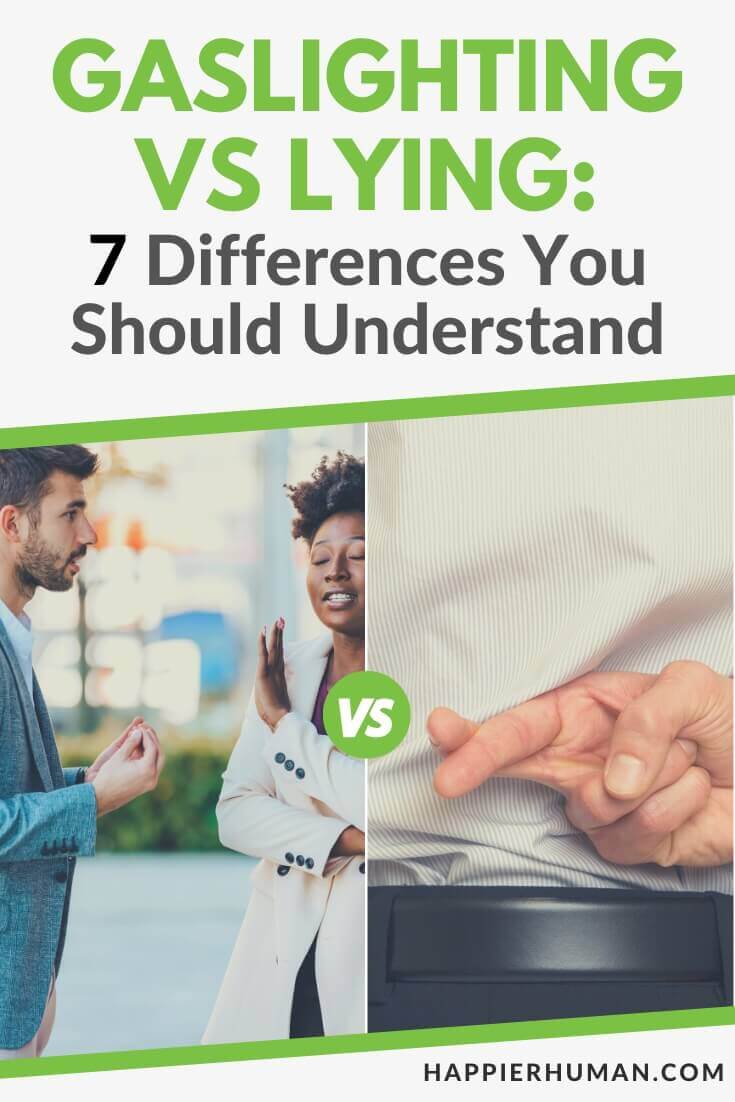At first, gaslighting and lying can easily be mistaken for the same thing.
Upon closer examination, you’ll discover the subtle differences between gaslighting and lying, explained in this article. Before venturing into the details, why is it important to tell the two apart?
Understanding the differences between gaslighting and lying is critical when dealing with individuals who lie and try to manipulate us. Unfortunately, the person could be a parent, romantic partner, grown child, boss, or friend.
The knowledge you gain here can be applied in all relationships and day-to-day interactions and may save you from getting duped, scammed, misled, hurt, and betrayed. You’re also able to avoid or manage relationships with individuals who practice these toxic behaviors.
They include pathological liars, narcissists, and sociopaths, who all tend to manipulate and exploit good-natured or vulnerable people. Differentiating between the two concepts can help protect your mental and emotional well-being and keep you out of harm’s way.
Let’s continue with the definitions of gaslighting and lying. This will help you appreciate these harmful habits' distinctive differences later.
What Is Gaslighting?
‘Gaslighting‘ is a term psychologists use to describe a psychological tactic a person (the gaslighter) uses to manipulate and sow doubt in others. It often involves other tactics, such as lying and denying, to control how someone (the gaslightee) thinks and feels. The gaslighter can get the gaslighted to act according to whether they believe what they’re being told.
The person doing the gaslighting is usually in a position of power, such as a boss, and uses the strategy to keep you under their control.
In other cases, someone who feels inadequate may use gaslighting to gain control and subdue/dominate another person. As troublesome as this is, behavioral experts discovered the act isn’t always intentional.
Where Does the Term ‘Gaslighting' Come From?
The term “gaslighting” comes from the 1938 play Gas Light, which was later adapted into the 1944 film Gaslight. In the movie, the male protagonist (the husband) intentionally tells his wife things to make her question whether what she saw is real.
He kept telling her she was imagining seeing the gas light in the house dim when that was the case. His wife started believing she was losing her mind.
See 15 Best Movies About Gaslighting You Should Watch Today.
Effects of Gaslighting on the Victim
Identifying or recognizing when someone is gaslighting you is often tricky since different methods are used. These techniques are usually subtle and include withholding, denying, countering, diverting, blocking, forgetting, and trivializing.
It’s easy to overlook gaslighting if the individual is someone you trust, love, respect, or admire. Furthermore, gaslighters isolate their victims from their loved ones so they can’t alert them of what’s happening.
Often, the individual only realizes what is happening when confronted with the psychological impact of getting gaslighted. Common long-term effects or symptoms you’ve suffered from gaslighting include:
What Is Lying?
Lying is when someone withholds the truth about something or provides false information when knowing it’s not true. To be considered a lie in its broadest sense, the person must make the false statement “with the intention that someone else shall be led to believe it.” This is according to the Standford Encyclopedia of Philosophy.
Who would have thought lying could get so complicated? You also notice a person can lie by omission (withholding the truth) or commission (making a false statement). Lying or dishonesty is a part of human nature.
Humans tell lies from as early as childhood, usually to get out of trouble and not to deceive. Children don’t know they’re being dishonest until a parent or teacher calls out the behavior. Fibbing continues into adulthood and throughout a person’s lifetime, even though some lie more frequently than others.

When it comes to why adults lie, it’s usually to deceive, avoid guilt, shame, or embarrassment, or run away from consequences. Believe it or not, some people fabricate information for the sheer thrill of it. Psychologist, Dr. Paul Ekman, who has been identified as an expert on lying, came up with those reasons why people tell untruths.
Despite being a natural human tendency, lying is still morally wrong and can affect the person being deceived.
NOTE: While gaslighting and lying are two distinct things, lying is also an integral part of gaslighting. Gaslighters are known to misinform, twist facts, or change details of events to convince you that you’re the one who’s lying or have trouble remembering the facts.
Effects of Lying on the Victim
I have yet to meet a person who enjoys being lied to. The effects can be devastating, especially when it’s someone they love or trust. For me, dishonesty always feels like a betrayal. Perhaps you experience one or more of these other effects:
7 Gaslighting VS Lying Differences to Be Aware Of
Gaslighters tell lies but may do so for different reasons than your average everyday fibbers. The distinguishing element is the intention behind lying vs gaslighting, keeping in mind that gaslighting can be done unconsciously. A stark difference is also seen in the long-term effects. Let’s look at seven ways you can tell these two behaviors apart.
#1. Gaslighting is done to manipulate, and lying aims to deceive
Lying is simply stating information the person (the liar) knows to be untrue. They could also withhold information to prevent someone from discovering the truth.
Deliberately making a false statement is misleading and amounts to deception. People also lie to scam or defraud the other person for personal gain.
When someone gaslights you, it’s usually about mind control and causing emotional instability. It’s a wicked way for the individual to make others powerless and get their needs met.
Gaslighting someone is also a form of emotional abuse due to the severe effects it could have on the gaslightee’s mental health.
#2. Gaslighting is a form of psychological control, but not lying
Gaslighting targets the victim’s mind to gain control and create an imbalance of power. The gaslighter achieves this by intentionally distorting your reality, making you feel like what you’re seeing or feeling isn’t real. According to Forbes magazine, gaslighters often target the victim’s vulnerabilities, such as their race, gender, nationality, class, or sexuality.
Lying, by itself, does not necessarily amount to gaslighting or psychological control in its truest sense. The person will have to do more, e.g., intentionally try to distort your memory or sense of reality or cause you to question your emotional stability.
Elements of deception are involved, similar to lying. However, giving false information is often done to avoid consequences or gain the upper hand.
Something to note. While a gaslighter may not outrightly lie as compulsive liars do, they use a more subtle method called ‘forgetting.’ Usually, they will pretend they forgot something you said, they said, or something that happened. It’s a skillful way to avoid denying or getting caught in a lie.
#3. Gaslighting is a form of emotional abuse when lying isn’t
“Abuse is about power and control,” and gaslighting is an “extremely effective form of emotional abuse.” This is according to the National Domestic Violence Hotline. Psychologists classify it as emotional abuse because of the severe effects long-term psychological control has on the victim’s mental health.
Gaslighters carry out emotional abuse through various methods, including denying, minimizing, and dismissing your feelings.

Lying, by itself, has not been classified as a form of abuse despite the adverse mental effects. However, there’s a thin line. The cumulative psychological effects of being lied to frequently may take a toll on your mental health.
You may start questioning your memory or feel worthless since the person is treating you as if you don’t deserve to know the truth.
#4. People lie to protect themselves, while gaslighting is done to make you feel crazy
According to Paul Ekman, a top reason for lying is to get out of trouble. Even though it’s a natural tendency, lying can become an ingrained or pathological behavior when done repeatedly. Eventually, the individual begins to lie without thought or by default, sometimes for no reason. Psychologists call it compulsive lying.
Intentional gaslighting is more of a malicious act and a deliberate attempt to sow doubt. The gaslighter wants to confuse you and make you question your sense of reality, intuition, reasoning, and judgment.
Depending on the tactic being used, such as countering, they can cause you to doubt your sanity.
Sometimes, they will willfully recount the sequence of events differently to make you doubt your memory. Sometimes, they change the subject when you’re mid-sentence (diverting technique) or use a method called countering to question your reality and gain control. You’re left feeling confused or powerless at the end of the interaction.
Paige Sweet, Ph.D., an Assistant Professor at the University of Michigan who studies gaslighting, told Forbes the abusive tactic mentally destabilizes the victim and makes them believe what they’re seeing or experiencing isn’t real.
#5. Lying is a tactic to hide the truth, while gaslighting shifts blame
When someone states a false fact, they try to prevent you from knowing it. They may not think about the effects or consequences of their action, as is the case with compulsive lying.
In other cases, the person thinks it over and decides it’s best to cover up the truth. If you believe them, that’s it. You walk away, never knowing you were treated to a falsity.
There’s nothing else to do, like accusing you of causing the problem to make you feel ashamed or guilty. However, this is precisely what happens when someone gaslights you. Instead of lying or denying the truth, they deflect and shift the blame to you.
Blame-shifting, an emotionally abusive method, allows them to put the responsibility for what happened squarely on your shoulders.
Relationships experts call switching the focus on you ‘crazy making‘ since it puts you in defensive mode.
#6. Gaslighting involves the use of unique phrases to sow doubt but not lying
Intentionally done or not, gaslighting messes with your mind. You’re left questioning your emotional state and overall mental health, thanks to the skillful use of a specific type of language.

A famous way to get you to question your sanity is by telling you you’re imagining things. To add insult to injury, you get called ‘crazy’, ‘irrational’, or ‘overemotional’. Here are other common phrases used to cause mental confusion:
Incidentally, these are also example statements narcissists and other manipulators use.
On the other hand, liars aren’t aiming to diminish or confuse you by using special terms. They are more concerned with trying to convince you they’re telling the truth using phrases or statements such as follows:
#7. Lying can be beneficial, but not gaslighting
I can’t believe I’m making a case for why people lie, considering I find lying, dishonesty, and deception absolutely abhorrent. However, if we can put aside our feelings and look at this objectively, we might agree with those who suggest that lying can be beneficial.
How is this even possible when people often lie to protect themselves from the consequences of their actions and for personal gain? They also hurt others in the process.
Truthfully speaking (here’s the contradiction), lying can benefit people other than the liar. In explaining the Reasons for Lying, Dr. Ekman says that by lying, people can protect a loved one from harm, avoid emotionally devastating others, protect their privacy, and avoid public shame.
There is no benefit in gaslighting someone. The manipulation tactic is used to target the victim for malicious reasons and has harmful physical and psychological consequences.
Final Thoughts on Gaslighting vs Lying Differences
Both gaslighting and lying are considered toxic habits, and both have adverse effects on the person subjected to these behaviors. Those who practice these tactics usually have trouble communicating their needs or are fearful of consequences.
Regardless, being aware of the differences can safeguard you from falling victim to a liar or a gaslighter’s intention to fool or control you.
Social media is abuzz with the use of terms like gaslighter and narcissist these days… and for good reason.
Perhaps more people are realizing it’s not ok to be treated poorly by others. Just like it’s not okay to be discriminated against because of your race or gender, suspect you're being gaslighted at work? Discover 11 Warning Signs That Your Boss is Gaslighting You.
See Posts about Gaslighting and Toxic People:
- 13 Narcissist Traits, Characteristics, & Warning Signs
- Gaslighting at Work: 5 Signs, Examples, and Phrases
- 15 Ways to Turn the Tables on a Gaslighter in Your Life
- 19 Weird Things That Narcissists Do to Manipulate People
- 75 Gaslighting Quotes to Deal with Narcissistic Manipulators


